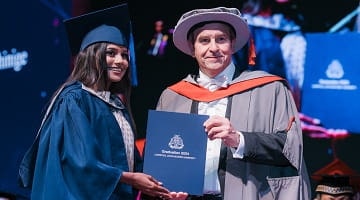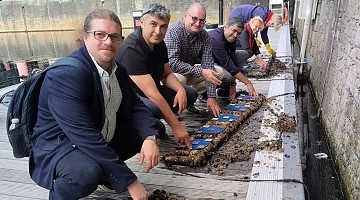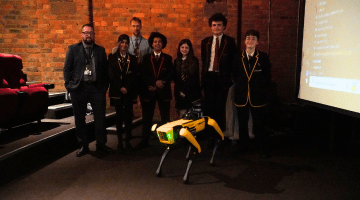Why study this course with LJMU?
- Excellent student support from academic tutors, technical staff and student mentors in both practical and academic activities throughout all levels of study
- Professionally accredited, design-led engineering curriculum emphasises developing understanding through application
- Excellent opportunities for paid year long industrial placements
- Accredited by The Institution of Mechanical Engineers
- Students studying on the MEng Marine and Mechanical Engineering programme may opt to pursue professional accreditation at the end of Level 6. At this stage of the programme successful students would be eligible for exemption from theoretical components of the Engineering Officer of the Watch (EOOW) professional qualifications, up to and including the level of Chief Engineer
- LJMU ranked 15th university in the UK for general engineering degrees (The Times UK University Rankings 2025)
About your course
Completing the professionally-accredited MEng (Hons) Marine and Mechanical Engineering at Liverpool John Moores University will enable you to graduate with a Masters-level qualification plus advanced level skills and experience that will boost your career prospects and future earning potential.
It will give you an in-depth understanding of the scientific principles and advanced design technology as well as the problem solving and management skills required to be a successful marine engineer.
This is one of the UKs leading engineering departments, with a supportive staff team and excellent facilities, including engine test facilities, full marine engine room and bridge simulators, materials testing laboratories and digital design studios, which you have full use of in practical sessions.
Links with national and international companies such as Bibby Line, Rolls Royce, Shell and Castrol mean that the course is tailored to the needs of employers and as an extension of this, we offer you the chance to undertake a years paid placement.
Course modules
What you will study on this degree
Further guidance on modules
Modules are designated core or optional in accordance with professional body requirements, as applicable, and LJMU’s Academic Framework Regulations. Whilst you are required to study core modules, optional modules provide you with an element of choice. Their availability may vary and will be subject to meeting minimum student numbers.
Where changes to modules are necessary these will be communicated as appropriate.
Core modules
Core modules
Optional Modules
Core modules
Optional Modules
Core modules
Optional Modules
Professional accreditation/links
Your Learning Experience
Excellent facilities and learning resources
Dedicated personal tutor, plus study skills support
Undoubtedly you will need academic and personal support at times during your course, and for this reason you will be allocated a personal tutor with whom you can discuss course-related issues, work on a personal development plan and set your own targets.
Assessment varies depending on the modules you choose, but will usually include a combination of exams and coursework.
Assessment is usually via a combination of exams and coursework, and sometimes by a portfolio of work, depending on the subject. A final year project gives you the chance to work independently and contributes considerably to your final mark. Your tutors will give prompt and constructive feedback via our virtual learning environment, face-to-face or as written comments. This will help you to identify your strengths as well as the areas where you may need to put in more work
Where you will study
This programme is delivered in the Byrom Street complex of LJMU’s City Campus. Here you’ll find high quality lecture theatres, meeting and seminar rooms plus social spaces and a large café. The Avril Robarts Library is just minutes away on Tithebarn Street.
Course tutors
-
 Lecturer/Senior Lecturer
Lecturer/Senior Lecturer -
 Subject Head
Subject Head -
 Reader
Reader -

-



Teaching is supported by well-equipped laboratories and workshops with state-of-the-art software and excellent technical support plus all students receive a personal copy of Solidworks-CAD software.
Career paths
Student Futures - Careers, Employability and Enterprise Service
A wide range of opportunities and support is available to you, within and beyond your course, to ensure our students experience a transformation in their career trajectory. Every undergraduate curriculum includes Future Focus during Level 4, an e-learning resource and workshop designed to help you to develop your talents, passion and purpose.
Every student has access to Careers Zone 24/7, LJMU's suite of online Apps, resources and jobs board via the LJMU Student Futures website.
Tuition fees and funding
- Full-time per year:
- £9,535
- Placement year:
- £1,905
The University reserves the right to increase tuition fees in accordance with any changes to the maximum allowable fees set by the UK Parliament. In the event of such a change, any fee increase will be subject to a maximum cap of 10% of the total course cost as originally stated at the time of your offer.
The fees quoted above cover registration, tuition, supervision, assessment and examinations as well as:
- library membership with access to printed, multimedia and digital resources
- access to programme-appropriate software
- library and student IT support
- free on-campus wifi via eduroam
Additional costs
Although not all of the following are compulsory/relevant, you should keep in mind the costs of:
- accommodation and living expenditure
- books (should you wish to have your own copies)
- printing, photocopying and stationery
- PC/laptop (should you prefer to purchase your own for independent study and online learning activities)
- mobile phone/tablet (to access online services)
- field trips (travel and activity costs)
- placements (travel expenses and living costs)
- student visas (international students only)
- study abroad opportunities (travel costs, accommodation, visas and immunisations)
- academic conferences (travel costs)
- professional-body membership
- graduation (gown hire etc)
Funding
There are many ways to fund study for home and international students. From loans to International Scholarships and subject-specific funding, you'll find all of the information you need on our specialist funding pages.
Entry requirements
Please choose your qualifications below to view requirements
Grades/points required from qualifications: ABB-AAB (128-136)
Work out how many UCAS points your qualifications are worth by visiting the UCAS Tariff Calculator.
Qualification requirements
How to apply
Securing your place at LJMU
Your university life
From accommodation and academic support to clubs and societies. Find out what LJMU has to offer.
Related Links
Talk to our students
Connect with a current LJMU student for advice and guidance on university life, courses and more.
See what our students are saying
At LJMU we want you to know you're making the right choice by studying with us. You can see what our students are saying about their experience with us through their reviews on the following websites:
Related Links
News and views
Browse through the latest news and stories from the university
The university reserves the right to withdraw or make alterations to a course and facilities if necessary; this may be because such changes are deemed to be beneficial to students, are minor in nature and unlikely to impact negatively upon students or become necessary due to circumstances beyond the control of the university. Where this does happen, the university operates a policy of consultation, advice and support to all enrolled students affected by the proposed change to their course or module.
Further information on the terms and conditions of any offer made, our admissions policy and the complaints and appeals process.




























